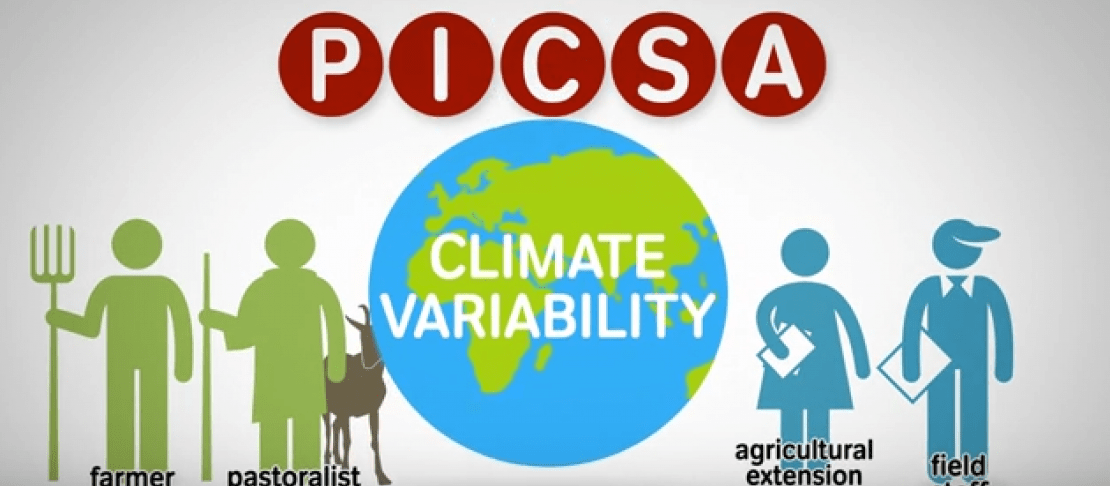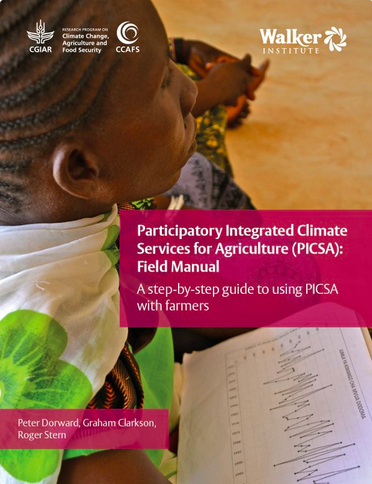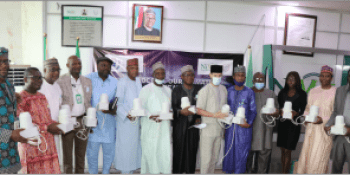New manual helps expand reach of climate services together with farmers

Participatory project uses novel approach to scale out climate information services together with farmers.
To make everyday farming decisions, such as when and what to plant, whether to move livestock to new pasture, or invest in new technologies, farmers need the right climate information, at the right time.
Research from the CGIAR Research Program on Climate Change, Agriculture and Food Security (CCAFS) shows that properly timed and targeted climate services can help farmers make informed decisions ahead of and during seasons.
A novel approach that attempts to supply farmers with this much-needed information is the Participatory Integrated Climate Services for Agriculture (PICSA) project.
Learn more via the video: Expanding the Reach of Climate Information Services together with Farmers
Climate services on the ground
The PICSA team and partners are successfully supporting smallholder farmers in a number of countries in sub-Saharan Africa to integrate locally relevant climate and agricultural information into their farming and livelihood decisions.
The work together with farmers starts long before the growing season with hands-on use of graphs of past local rainfall observations to understand variability and risk.
Participatory budgets and resource allocation maps help farmers to see how climate variability affects their current practices, and to explore alternatives that might be better adapted. Later, ahead of planting time, farmers receive a seasonal forecast and adjust their plans accordingly.
Farmers involved have reported changing practices, such as choosing new crops and varieties, diversifying livelihoods and adjusting livestock enterprises.
Learn more about some of the emerging results: How to best support farmers with useful climate information services.
The PICSA approach is currently being scaled out in Ghana, Malawi, Tanzania and Lesotho with the support of the National Meteorological Agencies and in collaboration with World Food Programme (WFP), International Fund for Agricultural Development (IFAD), government organisations and NGOs.
Scaling-out work includes training trainers on PICSA, such has field staff and agriculture extension officers that sit down with farmers to jointly create locally relevant climate information and much more. To their help they now have the newly developed PICSA field manual.
Step-by-step field manual supports climate services work with farmers
 The team, based at the Walker Institute, has developed a field manual that outlines their sustainable approach to help smallholder farmers deal with climate variability and risks.
The team, based at the Walker Institute, has developed a field manual that outlines their sustainable approach to help smallholder farmers deal with climate variability and risks.
The PICSA manual has been designed to support field staff in their work with farmers in the lead-up to, and during, agricultural seasons.
Emphasis is placed on supporting farmers, with information and tools, to make decisions that best suit their individual contexts and objectives.
In the manual the PICSA approach is broken down into participatory activities that field staff facilitate with groups of farmers through a series of meetings. The work couples local climate, crop, livestock and livelihood information with participatory planning tools that farmers can use to decide the best farming and livelihood options for them.
PICSA makes extensive use of historical climate information provided by national Meteorological Services to facilitate farmers to explore risks and opportunities.
The manual was officially launched end of October during a well-attended webinar. The session saw a welcome by Professor Julian Park, Head of School, Agriculture Policy & Development, Walker Institute University of Reading. Dr. Peter Dorward from Walker Institute talked about the PICSA approach and manual, including experiences and lessons learned from the work and efforts to scale it up. Dr. Dorward also disclosed what’s next for PICSA.
Professor Roger Stern presented on national metrological services and the important role they play for PICSA. After the one-hour long presentation, the audience was invited to provide feedback and ask questions. Download their presentation.
Watch webinar: Online Launch of the Participatory Climate Information Services for Agriculture Manual
Related reading and information
- Download: Participatory Integrated Climate Services for Agriculture (PICSA) Manual
- View presentation:
- Watch video by partners in Ghana: Participatory climate services for farmers
- Blog: How 'training-of-trainers' reach farmers with participatory climate information services
- Project Page: Walker Institute PICSA page
- Getting participatory agriculture climate services out to farmers
The work is lead by the Walker Institute as part of the CGIAR Research Program on Climate Change, Agriculture and Food Security (CCAFS) work. For further information get in touch with PICSA project leader Peter Dorward (p.t.dorward@reading.ac.uk)



